Sign up for our newsletter
Subscribe to our emails
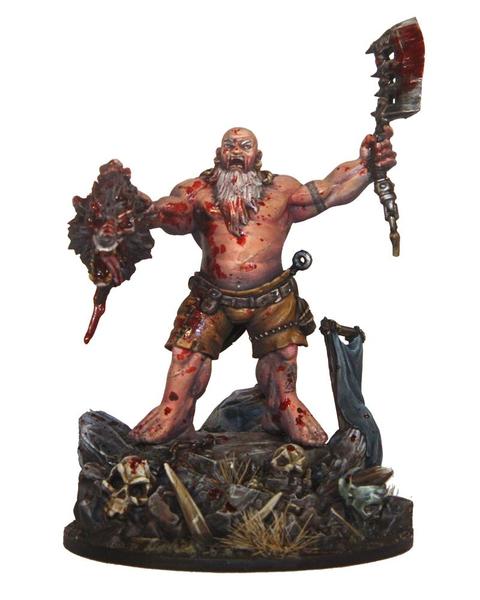
54mm resin models by top industry sculptors. Every miniature in the range includes a thematic scenic base. Next to no flash, precise details and easy to assemble models, are hallmarks of the Judgement range.
£35.00 £31.50
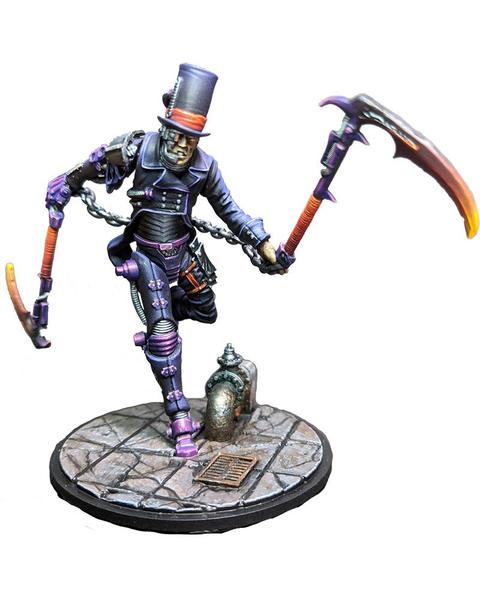
54mm resin models by top industry sculptors. Every miniature in the range includes a thematic scenic base. Next to no flash, precise details and easy to assemble models, are hallmarks of the Judgement range.
£35.00 £31.50
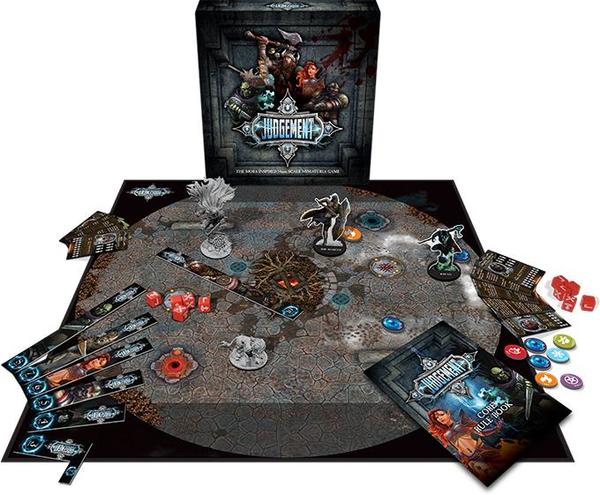
Judgement is a 2 player table-top miniatures game inspired by the Multiplayer Online Battle Arena (MOBA) computer game genre. In Judgement you play the role of a demigod that summons mortal heroes to the shadow plane of In-Between to capture Souls that fuel your immortal power. Each hero is represented on the table-top by a finely crafted 54mm scale resin miniature with incredible detail and dynamism.
£77.50 £54.00
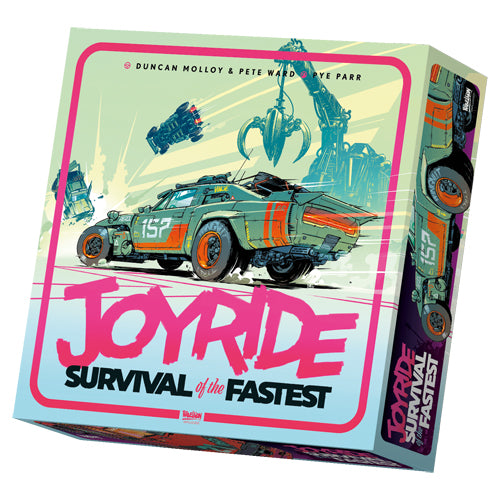
Joyride: Survival of the Fastest is an explosively fun board game of loud, fast, high-interaction racing for two to four players. Tactically plan your route, push your luck to take corners at speed, and crash into your rivals to knock them off course.Choose a car with unique abilities that change the way you race. Do you want the reliability of Auto-Pilot, the precision of Handbrake Turn or the chaos of Donut? Manipulate dice on your dashboard, pushing your luck to pull ahead. Will you lock in your results for maximum control, or risk rolling them to gain an extra inch?Move from checkpoint to checkpoint across open maps on the double-sided board. Each map comes different track layouts for every player count and skill level. Checkpoints can be crossed from any direction, so plan a racing line that maximizes your chances, even if it means racing into oncoming traffic.Smash into your opponents to spin them around or push them out of your way. Sometimes the best racing line is the one that will knock your opponents off-course.Gather powerful items as you race, letting you fire rockets, drop oil slicks and even call in air strikes to damage enemy vehicles. Damage permanently blocks part of your dashboard, so think carefully about where you decide to place it. Do you really need two spaces to store items? Maybe it’s better to give up fifth gear?—description from the publisher
£45.00
A tower building game.Jenga is played with 54 wooden blocks; each block is 3 times as long as it is wide, and slightly smaller in height than in width. The blocks are stacked in a tower formation; each story is three blocks placed adjacent to each other along their long side, and each story is placed perpendicular to the previous (so, for example, if the blocks in the first story are pointing north-south, the second story blocks will point east-west). There are therefore 18 stories to the Jenga tower. Since stacking the blocks neatly can be tedious, a plastic loading tray is included.Once the tower is built, the person who built the tower moves first. Moving in Jenga consists of taking one and only one block from any story except the completed top story of the tower at the time of the turn, and placing it on the topmost story in order to complete it. Only one hand at a time may be used to remove a block; both hands can be used, but only one hand may be on the tower at a time. Blocks may be bumped to find a loose block that will not disturb the rest of the tower. Any block that is moved out of place may be left out of place if it is determined that it will knock the tower over if it is removed. The turn ends when the next person to move touches the tower, although he or she can wait 10 seconds before moving for the previous turn to end if they believe the tower will fall in that time.The game ends when the tower falls in any significant way -- in other words, any piece falls from the tower, other than the piece being knocked out to move to the top. The loser is the person who made the tower fall (i.e. whose turn it was when the tower fell); the winner is the person who moved before the loser.The same game concept was published in 1984 by Fagus under the name "Hoppla - eins zuviel!"According to the designer, the game was developed from Takoradi blocks/bricks. "Jenga" is Swahili for "build".
£15.00 £13.50
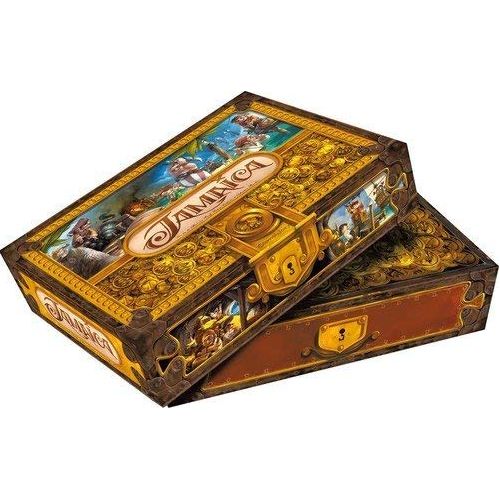
Summary: This is a pirate-themed tactical race game with player interaction and side goals (e.g. detouring for treasure). The winner is the player who best balances their position in the race with their success at the side goals.Setting: Jamaica, 1675.After a long career in piracy, Captain Henry Morgan skillfully gets appointed to be Governor of Jamaica, with the explicit order to cleanse the Caribbean of pirates and buccaneers! Instead, he invites all of his former "colleagues" to join him in his retirement, to enjoy the fruits of their looting with impunity. Each year, in remembrance of the "good old days," Morgan organizes the Great Challenge, a race around the island, and at its end, the Captain with the most gold is declared Grand Winner.Goal: The game ends on the turn when at least one player's ship reaches the finish line, completing one circuit around the island of Jamaica. At that point, players are awarded different amounts of gold in accordance with how far away from the finish line they were when the race concluded. This gold is added to any gold a player gathered along the way by detouring from the race to search for valuable treasure, by stealing gold or treasure from other players, or just by loading gold as directed by the cards the player played during the race. The player with the most total gold acquired through all these means is then declared the winner.Gameplay: The game is played in rounds. Each player always has a hand of three cards, and a personal board depicting the five "holds" of their ship, into which goods can be loaded during the game. Each round, one player is designated as "captain," with the next clockwise player being captain in the following round, and so on. The captain rolls two standard D6 dice, examines her cards, then announces which die will correspond to the "day" and which to the "night." Each player then simultaneously selects a card from their hand and places it face down in front of them. Each card has two symbols on it, one on the left - corresponding to "day" - and one on the right ("night"). The symbols indicate either ship movement (forward or backward) or the loading of a type of good. After every player has selected a card, all cards are revealed simultaneously and then resolved clockwise one by one, starting with the captain's. When it is a player's turn to resolve her card, for first the left symbol on her card and then for the right symbol, the player will load a number of goods or move a number of spaces equal to the number of pips showing on the corresponding day or night die for that round. Thus the main decision each player makes during the game is which of their current three cards would best serve them on a particular turn, given the values of the day and night dice. Finally, during the race, when a player lands on a spot already occupied by another player, there is a battle. Battles are mainly resolved by rolling a "combat" die, but players may improve their chances by using "gunpowder" tokens from their holds, if they loaded any on previous turns. The winner of a battle may steal some goods or treasure from the loser.
£38.99 £35.10
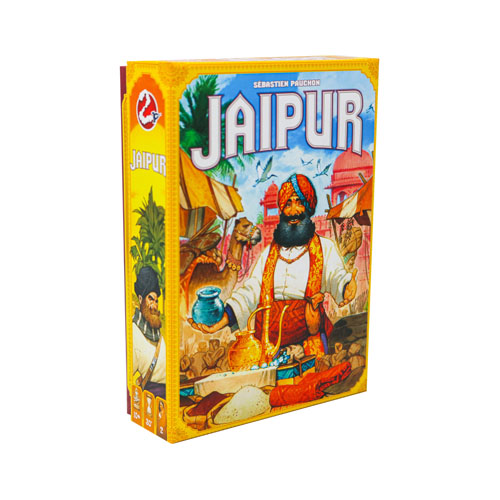
You are one of the two most powerful traders in the city of Jaipur, the capital of Rajasthan, but that's not enough for you because only the merchant with two "seals of excellence" will have the privilege of being invited to the Maharaja's court. You are therefore going to have to do better than your direct competitor by buying, exchanging, and selling at better prices, all while keeping an eye on both your camel herds.Jaipur is a fast-paced card game, a blend of tactics, risk and luck. On your turn, you can either take or sell cards. If you take cards, you have to choose between taking all the camels, taking one card from the market, or swapping 2-5 cards between the market and your cards.If you sell cards, you get to sell only one type of good, and you receive as many chips for that good as the number of cards you sold. The chips' values decrease as the game progresses, so you'd better hurry! On the other hand, you receive increasingly high rewards for selling three, four, or five cards of the same good at a time, so you'd better wait!You can't sell camels, but they're paramount for trading and they're also worth a little something at the end of the round, enough sometimes to secure the win, so you have to use them smartly.
£20.00 £18.00
It's Kind of a Fun Story is a getting-to-know-you storytelling game for acquaintances or a revealing party game for friends you thought you already knew everything about. Players tell stories, compete to best fit card descriptions, and sometimes steal cards from one another, in a bid to get to know each other and win!To begin, each player takes one 'Nope' card and two 'Hear Me Out' cards. The deck is then shuffled, placed in the center of the table, and ten 'Take a Chance' cards are placed beside it.On your turn you draw a card and follow its instructions. There are four types of cards. The Story Cards are worth two points, while the others are all worth one.When you draw a Story Card, you must answer the question on the card, such as 'what was your least favorite job?' or 'who was your arch-nemesis growing up?'. If for some reason you do not wish or do not have a story for the card, you may skip it and draw a new card. Another player may take a skipped card to answer on his turn rather than drawing a new one if he wishes.If you are the only one who answered the Story Card, you place it in your score pile. However, a player may discard a 'Hear Me Out' card if she also wishes to tell a story for the prompt. Players then vote on who should win the card. If you have already used your 'Hear Me Out' cards, you may place a 'Take a Chance' card into your score pile instead, in order to answer another player's Story Card. These are worth negative one point.The 'Left or Right' cards require you to decide which player on either side of you best fits the description on the card. The 'Point a Finger' card requires everyone to vote on who best fits the description. Finally, for the 'Everybody Answers' card, each player gives a brief answer to the prompt or question and then votes on who wins the card.If, during a story, the topic ever veers into territory you are not comfortable with, you simply hold up your Nope Card, and the story immediately ends. There is no penalty and the current player simply draws a new card. Nope Cards are not meant to be used in any competitive fashion, and are simply there to keep everyone comfortable with the game content.When a player wins a card they place it in their scoring pile. The first player to 7 points wins the game.Now that that’s out of the way, are YOU ready to lay all your cards on the table?The game contains 320 cards and an endless amount of stories to be shared.Trying to keep this PG? All our decks are customizable with Rated-R cards that can be removed if your mom wants in on the fun. (Or keep them, your call).-description from designer
£25.00 £22.50
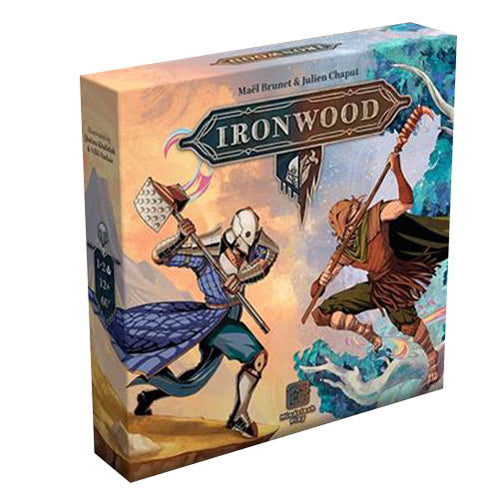
An eternal conflict for the land of Ironwood is raging between two factions: the stalwart and hard-working Ironclad, settlers of the iron mountains; and the ferocious Woodwalkers, swift and deadly shadows of the forests. Both factions struggle for the ultimate control over the land for its greatest treasure: the Larimor Crystals, a mysterious substance holding immense energy within. It can be found both inside the colossal mountains and scattered across the dense forests.The Ironclad extract the essence of the crystals and process their energy to fuel their machines and mechanical inventions. If they succeed, their giant forges will swarm the land with endless armies, and establish ultimate dominance over Ironwood.The Woodwalkers use the crystals’ raw magical power to discover and retrieve three ancient totems from secret ritual sites, hidden in the mountains. Once retrieved, the combined power of these totems will summon the Guardian, the ancient protector of the woods, to wipe out the Ironclad once and for all.One way or another, the eternal conflict is finally coming to an end.Ironwood is a rules-light, highly asymmetric, card-driven tactical game for 1-2 players. Each round, you and your opponent alternate playing a total of 3 of your faction-specific cards for their action effects. These effects include positioning your warbands, initiating combat, extracting crystals, bestowing temporary passive effects, and many more. When combat occurs, you will use the same cards for their combat values instead, in a simultaneous bid to gain combat bonuses, inflict and fend off casualties, and augment the Dominance value of your warbands to win the combat.The two factions are completely asymmetric in their play styles, decks, victory conditions - even in which parts of the map they can access.As the Commander of the Ironclad, your primary goal is to lay down the foundations of your forges in the outer mountains, and once you have collected enough crystals, build forges on the foundations. As the Chieftain of the Woodwalkers, your mission is to locate your people’s ancient totems through Vision cards, clear the path to them by defeating Ironclad warbands, and finally securing them in the outer forests, beyond the Ironclads’ reach. Once you have retrieved the third totem as the Chieftain, or built the third Forge as the Commander, you immediately win the game.Ironwood also features a low-upkeep solo mode against the Ironclad or the Woodwalkers. Although both solo opponents work on the same main principles, each of them bears its faction’s unique aspects and features.—description from the publisher
£47.30
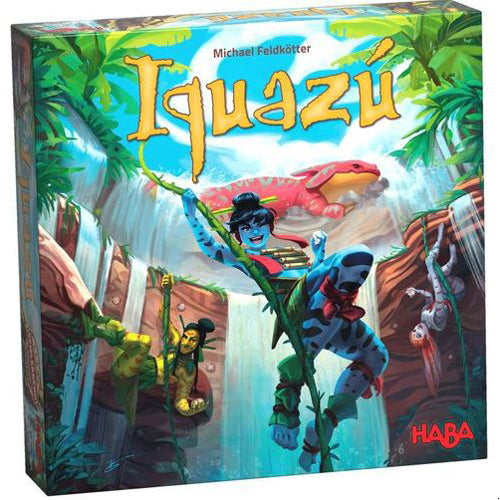
The Inox people have been living peacefully in the Land of the Waterfalls for a long time, but now there is a dangerous threat. Evil Rhujas roaming the land want to capture the gemstones of the Inox. That's why the Inox have selected the hardest to reach and most dangerous place to hide their gemstones: the rock wall behind the Iquazú waterfall. Their water dragon Silon blocks the waterfall so that the brave Inox can rappel down the rock wall behind it to place their gemstones there, out of harm's way. The gushing water and the dangerous water snakes at the bottom will stop the Rhujas from getting the gemstones. Which player in Iquazú will manage to use their cards skillfully and place their colored gemstones in the best spots?Each turn in Iquazú, players either draw four cards or play cards of a single color from their hand to place one of their gems in an empty space on the board the same color as the cards they played. If you place in the leftmost column, you play only one card, in the secondmost left column, two cards, and so on. The last player in turn order adds a water droplet to the highest empty spot in the leftmost column after their turn.Once the leftmost column is full, players earn points based on how many gems they have in this column and they earn a bonus token if they have the most gems in a horizontal row. Bonus tokens can let you draw cards, ignore the color rule, earn points at the end of the game, and take another turn. Players then slide the waterfall right one column to make new bonuses appear and the leftmost gems disappear. Whoever holds the water droplet box passes it right. Players continue taking turns until the final column is filled, at which point players collect bonuses for the final time, then added any points collected to their score.
£30.00
A new, spicier version of the hit conversation game, Insider, which sold 100,000 copies worldwide! While trying to find the correct answer to the quiz you also need to be on the look out for the insider that is manipulating the game from behind the scenes. Some tricky new elements have been added to insider such as, more difficult theme cards, the new "follower" role, and some "off-limits question" cards. You can play with this version only. In addition, you can also add this version together with the original game, Insider, and play with up to 11 people in a team battle. If you want more Insider fun then this is for you!This game has 42 all new, more difficult theme cards and a 3 minute hourglass, exciting "black rules", "team rules" that can be used when playing together with the original Insider and many other exciting things! Of course Insider Black' can be played as a standalone game too!There are many new ways to play!The "follower" has been added. The follower role card can be used when 6 or more players are playing the game. The follower teams up with the insider and tries to support the insider during play."Off-limits question cards" that prohibit certain questions. These cards make certain types of questions off-limits and are not allowed to be asked by players. Depending on which of the 5 off-limits question cards is in play, for example, "questions about the master can't be asked", specific topics or questions are unable to be asked.Team battle when played together with the original Insider. Split into two teams and try to find the opposing team's insider. The team that answers the quiz correctly first has an advantage so even the quiz can get heated!—description from the publisher
£18.00
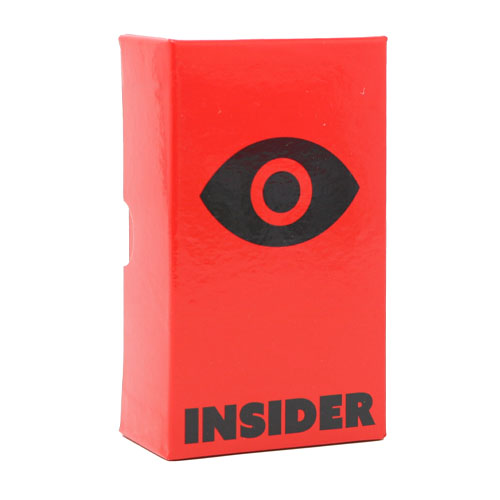
Do we really have free will? Who decides this? Are we controlled by what we hear and what we see, even while thinking we decide freely? Insider is a game that deals with these questions. While communicating to others, you have to find the right answers to a quiz or find the "insider" who is manipulating the discussion. The insider will do everything to hide their identity while misleading the others.In more detail, players are assigned roles at random. One player is the "master", and they secretly select a word from a set given in a deck of cards. (In a variant given in the rulebook, they can freely select and write down a word.) The "insider" player, whose role is not known to the other players, will then secretly view the word. The rest of the players are known as "commons". The commons then have approximately five minutes in which to ask the master "yes" or "no"-type questions so that they can deduce the secret word. The insider attempts to secretly lead the commons towards the correct word. If the commons fail to guess the correct word, everyone loses.If, however, the word is correctly guessed in the allowable time, the master flips the sand timer, and the commons and master have until the sand runs out to discuss the game and deduce the identity of the insider. If they guess correctly, they win the game together; if they do not, the insider wins.
£20.00 £18.00
Subscribe to our emails